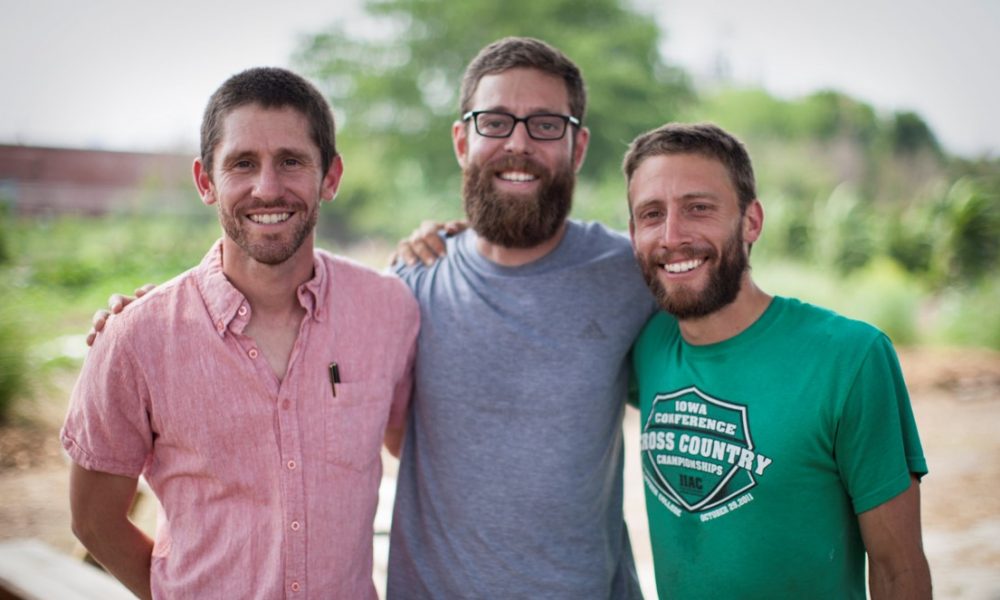

Today we’d like to introduce you to Daniel, Tommy and Mark Garcia-Prats.
So, before we jump into specific questions about the business, why don’t you give us some details about you and your story.
Tommy, Mark, and I are three (3) of ten (10) brothers all born and raised in Southwest Houston. While we share so much in common, each has followed their own passions, moving to the various part of the country (the 10 of us went to 10 different colleges) and launching careers in different fields.
I (Dan, #8) moved home to Houston from Silicon Valley in early 2013, getting a job as a manufacturing engineer for a small local oil and gas manufacturer, and at the invitation of my older brother Mark (#6), an educator at the time, and his wife Diana, rented a room at their house in the East End. Around the same time, my other older brother Tommy (#7) had moved back to Houston after his most recent stint farming in Nicaragua. He had intended to find a job farming in the Houston area but struggled to find opportunities, especially in organic and sustainable farming operations. In many ways, the lack of agricultural opportunities for Tommy was the genesis of our current venture.
Tommy began teaching gardening at an HISD school in the Gulfton area and was shocked at the prevalence of obesity among his young students and their families. For Tommy, there was a direct connection between his inability to find a job farming and the staggering levels of obesity in children. At the time, he was considering searching elsewhere in the country for farming opportunities, but his experience at the school made him feel that his talents as a farmer could be best used here in Houston to help build a healthier city.
Tommy, Mark, and I began meeting weekly to brainstorm ways in which farming could challenge the food access and diet-related health issues in Houston. This went on for several months as we developed the concept for urban farming further, writing a business plan, establishing our core philosophy, identifying key metrics for success, and addressing obstacles that could present challenges. Each of us brought something unique to the project; Tommy with his background in innovative organic and sustainable agricultural practices; Mark with his background in education and pursuit of his MBA in commercial real estate finance; and I hoped to bring my technical engineering background, experience in operations and production, and interest in and passion for social entrepreneurship. A local businessman heard we were searching for land to pursue an urban farm and offered the use of a property his company was not utilizing which would eventually become our first farm.
In early 2014, we founded Small Places LLC and launched our first farm, Finca Tres Robles (Spanish for “Three Oaks Farm”), located just a few miles east of downtown in Houston’s historic Second Ward. The 1.5-acre lot had been vacant for almost eighteen (18) years before we began transforming this unused land into a productive green oasis that would serve the neighborhood.
Limited capital, while challenging, forced us to be creative and find innovative ways to get the farm off the ground, identifying untapped resources available, and utilize every aspect and advantage of our urban environment. Through a strategy known as “Limited Resource Farming,” we collected green organic waste – mostly ground woodchips from tree trimming companies and coffee grounds from area gas stations – to build fertile soil from scratch, essentially creating fields of compost rich in the nutrients and microbes needed for organic fruit and vegetable production. Piece by piece and day by day, we built the farm up, initially focusing on the fertility of the soil but slowly moving far beyond reinvesting our revenue to install essential infrastructure including retrofitted shipping containers for an office, tool storage, and farm stand, stainless steel greenhouse, washing area, composting system, and developing the area under our three oak trees into a shared event space.
Simultaneously, we began diversifying beyond the growing and selling produce by providing classes to the public on a range of topics from gardening and baking, hosting school groups for field trips, and hosting seasonal pop-up dinners in partnership with local chefs to help fundraise for our operation and initiatives.
A little over a year ago, the farm took on an extra bit of meaning for us as we hosted the wedding of our older brother Joe Pat (#4) to his wife Michelle. It was a special night for our family and extra special for us to have the farm be the venue for an unforgettable celebration. This coming year, we will focus more on sharing our farm as a venue for any number of events from weddings and pop-up dinners to corporate workshops and dance performances.
These past four and half years building a productive farm that serves to improve the health of our community and challenge the health issues facing our city have been quite an adventure and one we’ve been proud to have taken. We still feel that we are just getting started and have a vision of expanding agriculture to all communities in Houston to install health infrastructure into our communities that can connect us to our food, our community, and our neighbors.
Overall, has it been relatively smooth? If not, what were some of the struggles along the way?
Our journey has not been without challenges. Farming, in general, is not perceived as a serious business venture or a viable option to earn a living or turn a profit. Many view urban farming in particular as work that should be charitable or does not recognize the value of including farms in urban spaces. Additionally, the culture surrounding food and the demand for convenience, the prevalence of poor eating habits, and consistency of dining out creates a large hurdle for us. However, there is a desire for people to learn and alter habits but limited resources to support these changes. The comprehensive education and community components of the business are vital in addressing these challenges. Becoming a part of the shift in this perception and culture adds value to our business.
Land access and security also have been a major challenge to launching and scaling our business, especially as a bootstrapping startup. We have had two (2) separate attempts to secure and purchase our current property be undercut at the last minute. For these urban agricultural spaces to fulfill their potential health impact, they must be embedded in these communities for the long-term, ideally permanently. A large motivation for launching the company was to put ourselves in a position to be leading contributors in developing public policies for making land more accessible for agriculture in the city. We strongly believe that with properly thought out policies, Houston could make long-lasting, system changes to significantly improve the health outcomes and quality of life of underserved and forgotten communities in and around the city.
Affordability has been a challenge in making our products more broadly accessible to everyone in our community. Margins on fruit and vegetable production are quite small and that makes keeping our prices low difficult. We offer East End discounts for our CSA members that live in the four (4) zip codes around us to encourage our neighborhood taking advantage of our fresh produce. Even with the discount, the CSA program can still have financial barriers for many. This has forced us to be creative and innovative, choosing instead to invest our time and energy to develop other methods of distributing products throughout our neighborhood and focused on maximizing the impact our products can provide. In the Spring of 2017, we launch our Preschool Produce Program in partnership with Ninfa Laurenzo Early Childhood Center, the local HISD preschool just a few blocks from the farm, and the Houston Food Bank. Our farm earmarks ten (10) CSA shares to go to deserving families at the preschool and we have found generous community members to sponsor families, allowing us to provide these weekly bags of produce for free. Through the Houston Food Bank, the parent attends monthly healthy cooking classes on the farm to navigate ways to prepare the fruits and vegetables that will be in their bags for the coming weeks. By collaborating with the local preschool and the Houston Food Bank, we are able to overcome the affordability gap to provide our fresh produce and healthy cooking education to members of our community that would not have it otherwise.
Finca Tres Robles/Small Places – what should we know? What do you guys do best? What sets you apart from the competition?
Small Places LLC was founded to develop an innovative and market-driven solution for dealing with the growing issues surrounding the frightening realities of the lack of agricultural opportunities and the related health and food access disparities in much of the Houston area. In 2014, we started our first urban farm called Finca Tres Robles (Spanish for”3 Oaks Farm”) to be a resource for residents of Houston’s East End. On 1.5 acres of leased land in the Second Ward, we sustainably cultivate fresh produce that we distribute through the farm and community partners to serve those residents closest to the farm. We also host classes and field trips on a wide range of topics and provide the space as a cultural center for events, dinners, and gatherings. Each aspect of the farm serves as a vital function in bringing our community together around healthy living.
Even though we have been spending more and more on healthcare, we have continued to grow unhealthier. Eighty-three cents of every Medicaid dollar goes to treat chronic health issues such as heart disease, stroke, type 2 diabetes, and obesity. These are among the most costly and preventable of all health problems, most of which are directly related to diet and lifestyle. Healthcare does not equal health, and we’re not alone in recognizing this. Deloitte, a global consulting firm, found that 80% of health outcomes are determined by social and environmental factors. Altering the way we eat, live, and connect with our neighbors is where we must begin to change the health outcomes within our communities.
With a lack of resources in our neighborhoods to support a culture of health, Small Places uses agricultural production as the focal point of multi-use developments to support community residents and stakeholders in building a healthy neighborhood. Our farm earns revenue through three main products:
The sale of our products distributed through our on-site farm stand, CSA Program (customers pay upfront for a weekly bag of farm fresh produce), farmers markets and restaurants (we grew almost 9 tons of produce in 2017 alone with 70% remaining in the East End), the hosting of classes and field trips, and through the use of our community space as an event venue for hosting and renting.
Further, Finca Tres Robles has been used as a proof of concept and a testing ground for our farm processes and systems with the continued goal of streamlining our operations to support expansion across the Houston area. A number of other organizations from hospitals, to nonprofits, to real estate developers have reached out to us about starting urban farms, recognizing the value of incorporating agriculture into their campuses, community centers, and developments. There is a desire to expand urban farming opportunities but a gap in the knowledge and expertise to make these spaces productive and impactful health of the communities they serve.
Small Places will fill that gap by providing Consulting and Farm Management Services where we are hired to design, implement, and manage farms for a client organization. For the past several months, we have been consulting with LBJ Hospital to help them launch a Community Farm on its campus located in the Kashmere & Trinity Gardens neighborhoods in northeast Houston. LBJ Hospital serves the largest catchment of any hospital and serves the most impoverished and underserved neighborhoods in Houston. It is very exciting for us to see the medical and healthcare leadership in this community have taken responsibility and tangible steps towards a long-term systemic approach to solving the health problems the communities have struggled with for years. These are the projects that motivate and inspire us to do our work and emphasize the significant impact agriculture can have in our communities and the important role farming should play in the future of our city.
What is “success” or “successful” for you?
The most important aspect of our success is dedication and focus on investing in the community in which we serve. For us agriculture isn’t about plants – it’s fundamentally about people.
In his book, Creativity Inc., Pixar founder Ed Catmull discussed how early on they developed the philosophy that “Story is King,” defining the crux of their success in their ability to craft and tell a good story with their animation technology simply being the tool by which they could achieve success. For us, “Community is King” and this philosophy has guided us as we have designed and built the farm and our company. We define our success by our ability to positively impact the lives of our neighbors. Agriculture and food are our tools by which we can most effectively, tangibly, and lastingly impact those we serve.
We have done our best to make decisions that are true to this core philosophy, from naming the farm in Spanish to reflect the rich Latino culture and history of the Second Ward, to providing discounts to CSA Subscription Program those that live in the surrounding four (4) zip codes (77011, 77012, 77023, 77003), or launching our Pre-K Produce Program with the local HISD early childhood center, Ninfa Laurenzo ECC, to ensure the youngest in our neighborhood grow up with every opportunity to lead healthy, happy lives.
Pricing:
- CSA Farm Share Subscription: http://csa.fincatresrobles.org/ – Half Share: $25/week & Full Share: $35/week 12 weeks – Discounts for East End residents!
- Preschool Produce Program Sponsor ($25/week, 12 weeks): http://sponsor.fincatresrobles.org/
- Weddings (Pricing varies): http://weddings.fincatresrobles.org/
- Private Event Rentals (Pricing varies): http://events.fincatresrobles.org/
Contact Info:
- Address: Finca Tres Robles
257 N. Greenwood St.
Houston, TX 77011 - Website: https://www.fincatresrobles.org
- Email: info@fincatresrobles.org
- Instagram: https://www.instagram.com/fincatresrobles/
- Facebook: https://www.facebook.com/FincaTresRobles/
- Twitter: https://twitter.com/FincaTresRobles
- Yelp: https://www.yelp.com/biz/finca-tres-robles-houston
- Other: http://www.smallplaces.org








Getting in touch: VoyageHouston is built on recommendations from the community; it’s how we uncover hidden gems, so if you know someone who deserves recognition please let us know here.

















